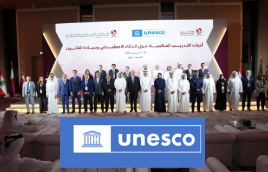From December 8 to 11, 2024, UNESCO, the Center for Legal and Judicial Studies at the Ministry of Justice in Qatar, and the Qatar National Commission for Education, Culture and Science organized a training on the Global Toolkit on Artificial Intelligence and the Rule of Law in Doha. The inauguration was held in the presence of HE Mr. Ibrahim bin Ali bin Issa Al Hassan Al Mohannadi, Minister of Justice and Minister of State for Cabinet Affairs, and HE Ms. Lolwah bint Rashid bin Mohammed Al Khater, Minister of Education and Higher Education. A total of 34 judges and prosecutors from 10 countries in the Arab region participated in the training: Algeria, Bahrain, Egypt, Iraq, Lebanon, Oman, Qatar, Saudi Arabia, United Arab Emirates and Yemen.
This four-day, in-person training addressed AI’s transformative potential in legal frameworks and operations, aiming to equip legal professionals with the knowledge and tools to evaluate and apply AI responsibly. The training is grounded in the UNESCO Global Toolkit on AI and the Rule of Law for the Justice Sector, which includes a range of activities, content, and resources tailored to address the intersection of AI, human rights, and the rule of law.
Throughout the training, participants engaged in interactive sessions on AI adoption, algorithmic decision-making, and emerging legal precedents. The sessions highlighted AI’s benefits, such as streamlined case management and predictive analytics, while addressing crucial ethical considerations, including algorithmic bias, transparency, and accountability. By examining key case studies and regulatory frameworks, participants assessed real-world implications of AI for privacy, fair trials, freedom of expression, and the right to information in upholding the commitment to human rights within the justice sector.
In his opening remarks, Mr. Salah Khaled, Director of the UNESCO Gulf States and Yemen Office, said, “AI is no longer a distant concept, it is already here, transforming various sectors. Yet, while AI promises efficiency and innovation, many of us remain uncertain about its implications for our judicial systems. More importantly, we are only beginning to understand how AI can help address some of the most pressing challenges we face in the judiciary today.” He urged participants to embrace this training opportunity, emphasizing, “This workshop is designed as an exchange of knowledge where we learn from each other’s experiences across jurisdictions. We will explore how countries are tackling these challenges and identify innovative solutions that respect human rights while embracing technological advancements.”
Together, UNESCO and Legal and Judicial Studies Center at the Ministry of Justice in Qatar aim to empower judicial systems that are not only proficient in AI integration but are also grounded in safeguarding transparency, accountability, and access to justice across the Arab region and beyond. This initiative reflects a shared commitment to advancing ethical AI usage in line with the UNESCO’s Global toolkit on AI and the Rule of Law and UNESCO’s Recommendation on the Ethics of AI.




